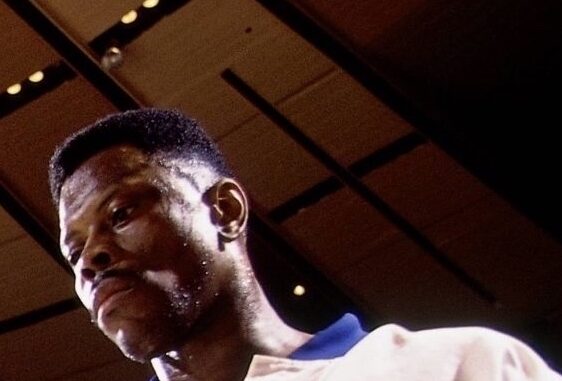
Patrick Ewing’s Retirement Anniversary: Remembering a Knicks Legend Who Gave Everything to New York
On this day in 2002, one of basketball’s greatest big men, Patrick Ewing, officially announced his retirement from the NBA. His words that day were filled with humility, gratitude, and a tinge of regret that still resonates with New York Knicks fans:
“I’m sorry I couldn’t bring a championship here. I hope one day New York will have a champion.”
For a player who epitomized grit, loyalty, and the relentless spirit of the city he represented for 15 seasons, Ewing’s farewell underscored the complicated yet enduring bond between the Hall of Fame center and the Knicks franchise.
The Arrival of a Savior
Drafted first overall in the 1985 NBA Draft, Patrick Ewing came into New York with the weight of a city’s expectations squarely on his shoulders. The Knicks, once a proud organization, had spent much of the early 1980s mired in mediocrity. Ewing, fresh off an illustrious career at Georgetown where he won a national championship and was named the NCAA Tournament’s Most Outstanding Player, was heralded as the man who could resurrect Madison Square Garden basketball.
He was big, strong, and skilled beyond his years — a defensive anchor who could dominate in the post and impose his will on both ends of the floor. New York embraced him instantly, not just for his talent but for his intensity and demeanor, which mirrored the city’s tough, no-nonsense identity.
The 1990s Knicks: Grit, Glory, and Heartbreak
The 1990s Knicks became synonymous with physical, bruising basketball, and Ewing was their undisputed leader. Year after year, he anchored a team that became one of the fiercest defensive units in the league, battling against Michael Jordan’s Chicago Bulls, Reggie Miller’s Indiana Pacers, and Alonzo Mourning’s Miami Heat in unforgettable rivalries.
Ewing’s individual accolades during this period were vast:
- 11-time NBA All-Star
- 1990 NBA Rookie of the Year
- 7-time All-NBA selection
- 1990 NBA Scoring Champion
But beyond statistics, it was his willingness to sacrifice for the team that stood out. He played through injuries, logged heavy minutes, and took the burden of being the face of the Knicks franchise in the most scrutinized basketball market in the world.
The pinnacle of his career came in 1994, when Ewing led the Knicks to the NBA Finals against the Houston Rockets. It was the Knicks’ first Finals appearance since 1973, and Ewing was at the heart of it, battling Hakeem Olajuwon in a clash of two titanic centers. Though New York pushed the series to seven games, Olajuwon and the Rockets ultimately prevailed.
Five years later, in 1999, the Knicks returned to the Finals, this time as the first No. 8 seed to ever make it that far. But Ewing was sidelined with an Achilles injury, and New York fell to the San Antonio Spurs in five games. For Ewing, it was another cruel twist of fate — to reach the mountaintop but be denied the chance to climb it himself.
The End of an Era
By the early 2000s, injuries and age had taken their toll on Ewing. After 15 years with the Knicks, he was traded to the Seattle SuperSonics in 2000, a move that left many fans heartbroken. He played one more season with the Orlando Magic before officially calling it quits in 2002.
It was during his retirement announcement that he uttered his now-famous words of regret. Ewing had given everything to New York — his blood, sweat, and countless sacrifices — but the ultimate prize, an NBA championship, had eluded him.
Still, Knicks fans never doubted his commitment. For a city that values effort and heart as much as results, Ewing’s legacy was cemented long before he hung up his sneakers.
Legacy Beyond the Championship
While critics may point to the absence of a championship ring, Ewing’s career cannot be defined by that omission. His influence on the game and the Knicks organization is undeniable.
- He is the all-time leader in Knicks history in points, rebounds, blocks, and games played.
- His No. 33 jersey was retired by the Knicks in 2003, a permanent reminder of his impact.
- He was inducted into the Naismith Memorial Basketball Hall of Fame in 2008.
Beyond the numbers, Ewing carried the Knicks into relevance at a time when New York basketball desperately needed a hero. He turned Madison Square Garden into the “Mecca of Basketball” once again, ensuring that the Knicks were a perennial contender in the Eastern Conference.
Life After Playing
Ewing’s post-playing career has kept him close to the game. He has served as an assistant coach in the NBA with several franchises and most recently returned to his alma mater, Georgetown, as head coach. While his tenure there was marked by ups and downs, his role as a mentor and leader remained consistent.
For Knicks fans, though, Ewing will always be remembered in blue and orange, patrolling the paint at Madison Square Garden with unmatched ferocity.
A Timeless Bond With New York
Twenty-three years after his retirement, Patrick Ewing’s legacy continues to loom large over New York basketball. While his words of apology reflected his deep desire to bring a championship to the city, the truth is that for Knicks fans, his effort, loyalty, and fight were more than enough.
New York still waits for its next championship, but Ewing’s presence during the Knicks’ golden era of the 1990s gave the city unforgettable memories. His legacy is not diminished by the absence of a ring — rather, it is enhanced by the respect he earned from fans who valued his commitment above all else.
On this anniversary, Knicks fans remember not just the heartbreaks, but the countless moments of triumph, passion, and pride that Patrick Ewing brought to the franchise. His career stands as a testament to what it means to be a New York Knick: relentless, loyal, and forever chasing greatness.

Leave a Reply